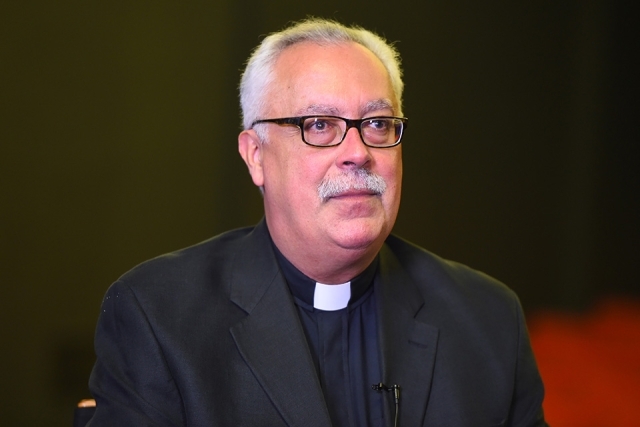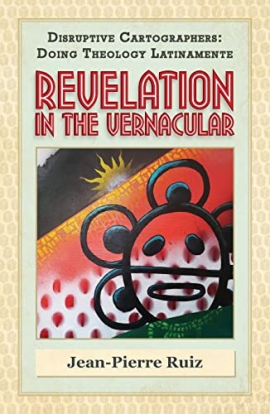
Revelation, the last book of the New Testament, helped fuel the Spanish colonization of the Americas. Italian explorer Christopher Columbus cited the book to justify his actions, believing it would help bring about the Second Coming of Christ, when he helped evangelize the “final” group of people who had not heard the Gospel.
Rev. Jean-Pierre Ruiz, S.T.D., explores this 16th-century encounter between the indigenous peoples of Puerto Rico and their Spanish colonizers, and its ongoing implications for interreligious understanding, in his new book, Revelation in the Vernacular. The book was nominated as one of the finalists in the theology category for the Association of Catholic Publishers 2022 Excellence in Publishing Award.
Fr. Ruiz, an Associate Professor in the Department of Theology and Religious Studies and Senior Research Fellow, Vincentian Center for Church and Society, discussed this and many other topics of similar interest during an online book launch, held on March 29, which was cosponsored by the Department of Theology and the University’s Institute for Critical Race and Ethnic Studies (CRES), for which he serves as Assistant Director.
Natalie P. Byfield, Ph.D., Founding Director of CRES and Professor of Sociology, helped moderate the program and stressed that it was an important opportunity to have a discussion focused on the history of a people often ignored. “More specifically, Revelation in the Vernacular takes on one of the core issues with which CRES hopes to deal: the erasure of people’s life experiences whose existence has been racially and ethnically minoritized by some of the major movements in the world— racism, slavery, the slave trade, and colonialism, to name a few.”
A noted Biblical scholar, Fr. Ruiz recalled that he was trained to work with ancient texts in the contexts in which they were produced and the ways in which they have influenced their readers. He has focused a great deal of attention on Revelation.

In his book, Fr. Ruiz wanted to find “countermovements” to the desecration and suppression of indigenous cultures by the Spanish colonizers and discover moments, spaces, and openings at work. “That’s important to me as a theologian and as a priest, because the place of Christianity has values within it that can be liberative and emancipatory.”
Fr. Ruiz noted that Pope Francis has turned his attention to improving relations with the indigenous peoples of Latin America. “Here, there is very clear evidence that the Holy Spirit does cause a change of heart, a shift in consciousness, and a change in stance. What we see is a real change in the direction of truly embracing the preferential option for poor and marginalized populations.”
The bishops of Latin America, Fr. Ruiz explained, gradually came to a new appreciation of the meaning and value of culture and “Enculturated Christianity,” that is, culture that speaks in the vernaculars of the peoples of Latin America.
In the wake of Vatican II, Latin American bishops focused on how indigenous values, practices, beliefs, and meaning-making authentically reflected the activity of God, Fr. Ruiz stressed. “Rather than continue the colonial legacy of suppressing that alternate knowledge, the Church needed to reevaluate these and recognize the spirit of God at work here,” he added.
In centuries prior, Fr. Ruiz noted that the rationale for destroying objects or documents of indigenous cultures on the part of colonizers was their consciousness of the power of language. “They intended to deprive people of their meaning-making, of their pasts, of those structures of stability that make it possible for them to continue meaningful lives, and replace it with something else. This is the sad and strange reality of empire and colonizing.”
Fr. Ruiz said he is inviting his readers to move from a two-dimensional understanding of divine revelation to a more three-dimensional view. “By two-dimensional, I mean where one might encounter Revelation merely in the printed text of the Christian scriptures. There’s more to it than that. We need to reenvision it as more three-dimensional.” This must be done “because we cannot limit or restrict the activity of the grace of God or put arbitrary restrictions on the spirit of God.”
Ramon Castillo, a student of Fr. Ruiz’s, who is working toward his master’s degree in Theology, found the discussion thought-provoking and engaging, while applauding the author’s skills as an instructor. “The books and academic articles Fr. Ruiz chose for class have allowed me a deeper understanding of different exegetical methods for interpreting biblical texts,” he said. “I was consistently exposed to information about culture and literature of which I was unaware.”
Fr. Ruiz's book is available online.
Related News
Q&A with School of Education Alumna Linda I. Rosa-Lugo, Ed.D. ’77ED, ’79M.S.Ed.
Linda I. Rosa-Lugo, Ed.D. ’77ED, ’79M.S.Ed., recently accepted a new role as President of the American Speech-Language-Hearing Association (ASHA). Prior to this, Dr. Rosa-Lugo has been an active...
TSOE Alumna Appointed Director of Curriculum in Amityville
Jessica Kemler ’99ED,’22Ed.D.—a double alumna of The School of Education at St. John’s University—began the new year as the new Director of Curriculum in the Amityville, NY, School District. “We are...
Alumna Celebrates Book Launch After Career Change
After developing a passion for helping the younger generation, Ashley Wilson ’14M.S.Ed. pivoted from a career in the music industry to work as an educator. She is also making her mark through her new...
